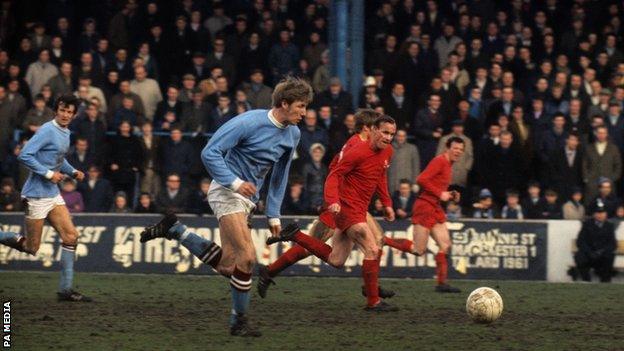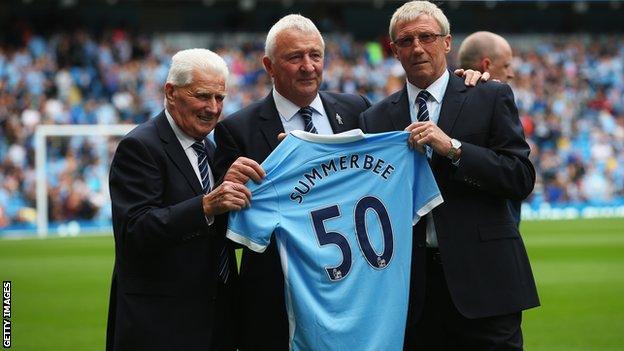Colin Bell dies: 'Man City legend could rival any of club's modern-day greats'
- Published

Bell made 501 appearances for City between 1966 and 1979, scoring 153 goals
Colin Bell, who has died aged 74, is a player who can take his place comfortably alongside any from the modern era in the list of Manchester City greats.
While many will make a well-argued and justified case for the likes of David Silva in any debate about the finest player to represent the club, there will always be a strong lobby convinced there has never been anyone better than the modest, unassuming but brilliant Bell.
He is, without question, one of the most significant and revered figures in the history of Manchester City Football Club.
Bell was one of the legendary Manchester City triumvirate, alongside Mike Summerbee and Francis Lee, that was the centrepiece of the hugely successful side of the late 1960s and early 1970s assembled by the wise, avuncular manager Joe Mercer and his maverick, brilliant coach Malcolm Allison.
Allison was the driving force behind the £45,000 deal that brought the young Bell to Maine Road from Bury in March 1966, and he openly admitted he used to spend scouting missions at Gigg Lane roundly criticising the player's perceived lack of ability in front of other interested managers in a bid to put them off.
In reality, Allison was desperate to sign a player he described as "world class", believing Bell would help transform Manchester City into one of Britain's footballing superpowers.
The deal was done, via this deception or otherwise, and what a reward it reaped as Bell went on to make 501 appearances for City over the next 13 years, scoring 153 goals as they became a serious force at home and in Europe.
'What a goal!' - Man City legend Bell scores superb volley
Under the fire and ice combination of Allison and Mercer, City won promotion to the former First Division, before winning the title in 1967-68 and then adding the FA Cup with a 1-0 win over Leicester City in 1969.
Manchester City, with Bell's magnificent athleticism earning him the nickname "Nijinsky" after the famous racehorse, won the League Cup against West Bromwich Albion in 1970 before further glory came with the European Cup Winners' Cup and the victory over Polish side Gornik Zabrze in the pouring rain of Vienna.
It was a surprise that this lavishly talented and flamboyant City side never went on to greater successes, but the partnership of Mercer and Allison fractured acrimoniously and further titles escaped them, most notably when the latter bought Rodney Marsh from Queens Park Rangers for £200,000 in March 1972, only for the signing to disturb the balance of a finely tuned side in control at the top of the First Division. They faltered and the title went to Derby County.
Bell, however, continued to forge a glowing reputation as one of the world's finest players, combining qualities of power, grace, creation and an ability to score crucial goals.
The quietly spoken Bell was, quite simply, the complete footballer.
He scored when City lost the 1974 League Cup final to Wolverhampton Wanderers and it was in that competition the following year, while still only 29, that Bell sustained the devastating injury that was to effectively end his career at the highest level.
It was on 12 November 1975, as City demolished arch-rivals Manchester United 4-0 in a League Cup fourth-round tie at Maine Road, that Bell damaged his knee so severely in a challenge with Martin Buchan that it took the best part of two years out of his career in its prime.
When Bell came on as a second-half substitute to make a return in the game against Newcastle United on 26 December 1977, the prolonged ovation he received from City fans is still regarded as one of the most emotional moments witnessed at the famous old ground.

In 2015, Bell joined former Manchester City players Tony Book (left) and Mike Summerbee (centre) on the pitch at Etihad Stadium to mark 50 years since Summerbee joined the club
Sadly, through injury not lack of endeavour or effort, Bell was only a shadow of his former greatness as the power and athleticism was reduced, but nothing could ever dim the devotion or admiration City's fans felt to the man who had brought them so much joy.
Bell had a short spell in the United States playing for San Jose Earthquakes, but the injury he suffered in 1975 deprived him of so many more peak years.
He was also a key part of England's set-up under Sir Alf Ramsey and Don Revie. Bell won 48 caps and was part of the 1970 World Cup squad in Mexico, playing an unwitting role in one of the most infamous substitutions of the time.
He was sent on as a replacement for the tiring Bobby Charlton with England leading 2-1 against West Germany in the quarter-final in Leon.
At the time, it seemed to make sense to rest the older player and replace him with the man regarded as the fittest player in the squad in such searing heat, but it backfired as West Germany turned that deficit into a 3-2 win to dethrone the reigning world champions.
England were betrayed in other areas and Bell was blameless, but fingers were still pointed at Ramsey for making the change.
Bell was part of England's team that failed to qualify for the 1974 World Cup and that injury deprived him of any further chances to reach the showpiece.
He later returned to his spiritual home of Manchester City to work with the club's young players, then as a club ambassador, and enjoyed glorious successes as the Premier League and the big domestic trophies returned under their Abu Dhabi-based owners.
The sign of the esteem in which Bell was regarded was confirmed in 2004 when Manchester City's fans voted to name one of the stands at Etihad Stadium in his honour.
There have been many greats at Manchester City, in the past and in the present, but Bell is the player those supporters will always call "the King".
